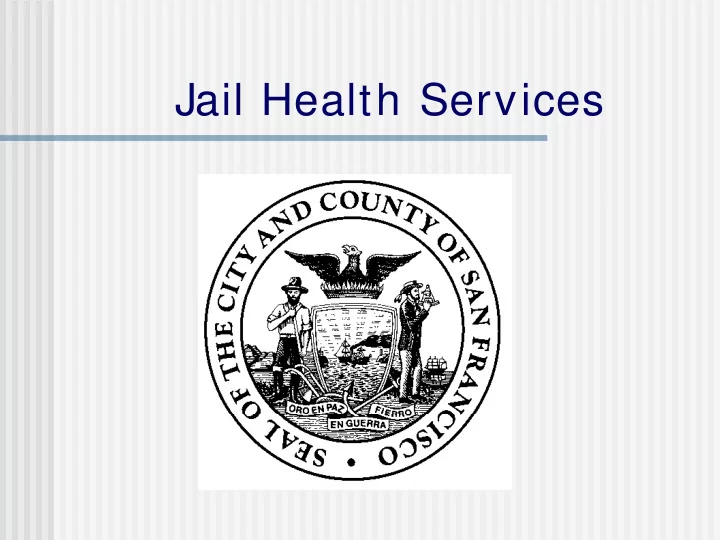

Jail Health Services
Correctional health is an integral part of the public health sector. Inmates and ex-inmates are part of the communities that we live in. What happens to them is vital to the health of the community and to public health . David Satcher, former US Surgeon General
Constitutional Right to Health Care [The] principles [behind the guarantee against cruel and unusual punishment] establish the government’s obligation to provide medical care for those whom it is punishing by incarceration. An inmate must rely on prison authorities to treat his medical needs; if the authorities fail to do so, those needs will not be met. Estelle v. Gamble, US Supreme Court (1976)
Innovative Programs/ Policy Issues/ Research Integrated Delivery System Women’s health program Diabetes program Chronic offender program COVER Project Impact of Affordable Care Act Transgender groups Condom distribution Flu vaccination program Crisis Intervention Team trainings Transition of complex medical/ mental health patients Integrated testing program BANPH Jail-based Hep B Free Campaign Research Navigator study Geriatric study Teaching
Complex Patients/ Difficult Transitions BH - 68 year-old-man, morbidly obese. Requires bariatric bed and assistance with bathing. Mild cognitive impairment and mental health problems. TL – 91 year-old-man with cognitive impairments. In jail x 3 years. Currently at SFGH. Needs assistance with ADLs. LP – 60 year-old homeless man with severe cognitive impairment. In prison for past 12 years. HIV+ , insulin- dependent diabetes, pulmonary hypertension, suicidal, alcoholic. Unable to understand and communicate medical status. Has never taken medications on his own, has never managed his diabetes for himself. Housing options limited by registered sex offender status. Needs assistance with basic life skills, e.g., grocery shopping.
Integrated Testing LHEAP Team (Linkages to Health Education and Prevention) offers screening, testing and disclosure for HIV, STD and hepatitis. Integrates previously “siloed” staff and intervention efforts. Collaborative effort between JHS and STD division.
FAP Bay Area Network for Positive Health (BANPH) Part-time Engagement and Linkage Specialist (funding ended in June 2012) Referrals from Jail Medical Staff and Supervised Pretrial Release Serves HIV+ prisoners incarcerated less than 72 hours and not engaged in HIV care Project evaluation data to inform national grant efforts Goal: To engage out of care clients in to care.
BANPH (continued) 80 prisoners identified Participants were found to have had an HIV diagnosis for approximately 10 years. Lengthy engagement process: 17 contacts over months (in some cases, over a two year period) Many reported not being in care because they didn’t feel sick. Effort is expensive and labor intensive, but when someone actually engages in care, extremely effective.
Jail-Based Hep B Free Campaign FAP leads the Jail Health Services implementation effort HBV testing, vaccination, and treatment efforts target API and MSM populations in the jails
Navigator Project (FAP & UCSF) Study to test the effectiveness of an enhanced case management intervention including peer navigation services available to HIV+ inmates leaving SF Jails. 360 participants over four years Length of participation: one year after initial release from jail Enhanced intervention includes: In-jail HIV prevention counseling One year of post-release intensive case management built upon peer navigation services.
Geriatric Research Project Needs Assessment: Patients JHS staff Custody staff Legal professionals Police officers
Teaching Ob-Gyn Residents HIV rotation 3 rd year medical students Nurse practitioner students
Recommend
More recommend